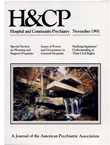Attitudes of Sheltered Care Residents Toward Others With Mental Illness
Abstract
The social acceptance expressed by 234 former mental patients and by the general public toward persons with serious mental illness was compared. Factors that may affect social acceptance of such persons, including personal characteristics and experiences that promote identification with mentally ill persons and the subject's level of psychological distress, were examined. Former patients expressed attitudes that were much more accepting than those of the general public. As hypothesized, individual characteristics and experiences likely to increase former patients' identification with their peers (that is, visible deviant appearance, a high level of involvement within the sheltered care community, and the experience of negative community reactions to a resident's facility) were related to a higher score on a Guttman scale of social acceptance. An increased level of self-reported psychological distress tended to moderate such supportive attitudes.
Access content
To read the fulltext, please use one of the options below to sign in or purchase access.- Personal login
- Institutional Login
- Sign in via OpenAthens
- Register for access
-
Please login/register if you wish to pair your device and check access availability.
Not a subscriber?
PsychiatryOnline subscription options offer access to the DSM-5 library, books, journals, CME, and patient resources. This all-in-one virtual library provides psychiatrists and mental health professionals with key resources for diagnosis, treatment, research, and professional development.
Need more help? PsychiatryOnline Customer Service may be reached by emailing [email protected] or by calling 800-368-5777 (in the U.S.) or 703-907-7322 (outside the U.S.).



